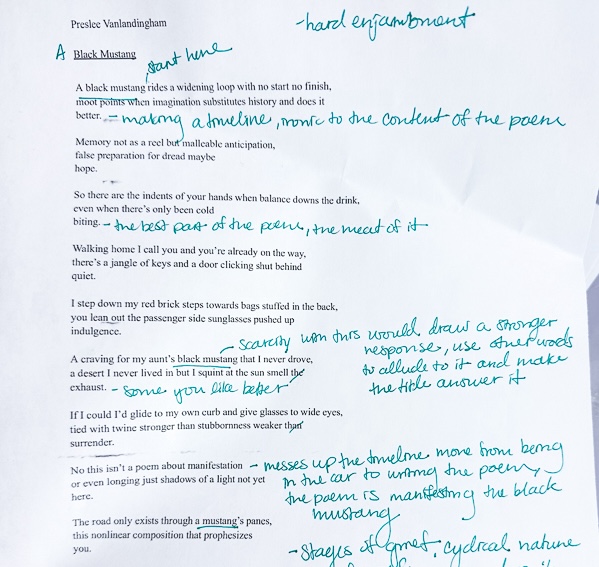
Wheeler Hall, where writing workshop classes take place.
4 Life Lessons Learned From Writing Class at Berkeley
Two of my favorite UC Berkeley classes were particularly impactful to me, and they were both creative writing workshops: Dramatic Writing taught by Hilton Als, and Verse taught by Tim Wood. They revealed the weaknesses in my writing practice while simultaneously empowering me to improve, and I learned key life lessons unrelated to writing itself that I will carry with me forever. (If you’re interested in taking a writing workshop, I share some tips on the application process at the end of this story).

Wheeler Hall, where many writing classes are held. Photo by Preslee Vanlandingham.
1. Be a Beginner
More often than not, we are our biggest critics. When I was entering these classes, I assumed that I already had to be an expert in what I was doing and that every error was disastrous proof that I did not belong there. Along the way, I realized this was purely a learning experience; there would be plenty of time in the future to expect perfection, but it did not belong here. When I felt allowed to mess up and fall short, I found I also permitted myself to write without the expectation of perfection immobilizing me. The more I found my weaknesses and met them with compassion rather than criticism, the clearer my evaluation of my skill level and what I could do to advance became. I stopped fearing being “found out” as a beginner and just enjoyed the process of being one.
2. Consider Constructive Criticism vs Judgment
In an intimate, seminar-style class, peer reviews are a common practice. I learned to be a conscientious commenter and to separate personal feelings from critiques so that my comments would only be in service of the author’s success. If you scribble a bunch of opinions on a piece, that doesn’t help the writer improve their work, it just makes them feel stripped down. When I received critiques, it revealed the disparity between my intention and the reader’s interpretation, and how I could bridge the gap to achieve the effect that I wanted to portray. Sometimes when you’re submerged for too long in your work, it’s difficult to be objective and clear about it—an extra pair of eyes can aid in the revising of the final product. It became second nature to ask myself whether what I was about to say was constructive rather than pointlessly critical, and that has helped me with conversations outside of class as well.

Poetry assignment after edits from a workshop session. Photo by Preslee Vanlandingham.
3. Mentors Want You to Succeed
Entering these workshops, I carried an illogical superstition that my professors were somehow anticipating my failure. But time and time again, I was affirmed that they were in my corner. The feedback I received on my drafts all carried the sentiment that they wanted me to go further for my benefit, to truly improve and grow as a writer. There wasn’t any sugarcoating, but it never felt brutal. Establishing that kind of trust with these mentors meant that I never felt my work was in the wrong hands. It taught me the importance of building connections with teachers in my life.
4. Discipline Beats Talent
A natural affinity for something is great, but anyone who has ever succeeded in their field can attest to setting good habits and not relying solely on innate talent. Plenty of people are talented, but few really act on it. Both of these workshops encouraged daily writing practice—there weren’t any specific expectations set on this practice, just allot dedicated time. This created good writing habits for me and reinforced the lesson that discipline will outrank talent every time.

Graduation photo of Preslee. Photo courtesy of Preslee Vanlandingham.
Application Process for Writing Workshops
I found these two classes while searching for courses that would fulfill my Creative Writing minor. There was an application process to enroll in both, typically consisting of a five to ten-page sample of your work and supplemental materials specific to each class. You apply the semester before the class is offered and learn of your acceptance before the semester begins so that you can accept your spot or not in order to give time to admit waitlisted students. There’s no guaranteed acceptance due to the restricted class size and the fact that students from all majors can apply.
Check out the full list of creative writing courses, learn about requirements for the minor, and contact the Creative Writing Minor Student Academic Advisor Laura Demir at demir@berkeley.edu for any additional questions.
Long-Lasting Impact
My two favorite creative writing courses, although differing in subject matter, instilled these essential lessons in me for life. They were both equally valuable in improving my writing and altering how I approach my post-graduate reality.
Preslee Vanlandingham is a recent graduate of UC Berkeley who majored in English and minored in Creative Writing.
Want More?
- Find out about Nina’s Life-Changing Class in Philosophy.
- Discover more Berkeley favorites from a senior.
- Learn about what you should tick off before you graduate from Berkeley.
- Read some more advice from seniors at UC Berkeley.